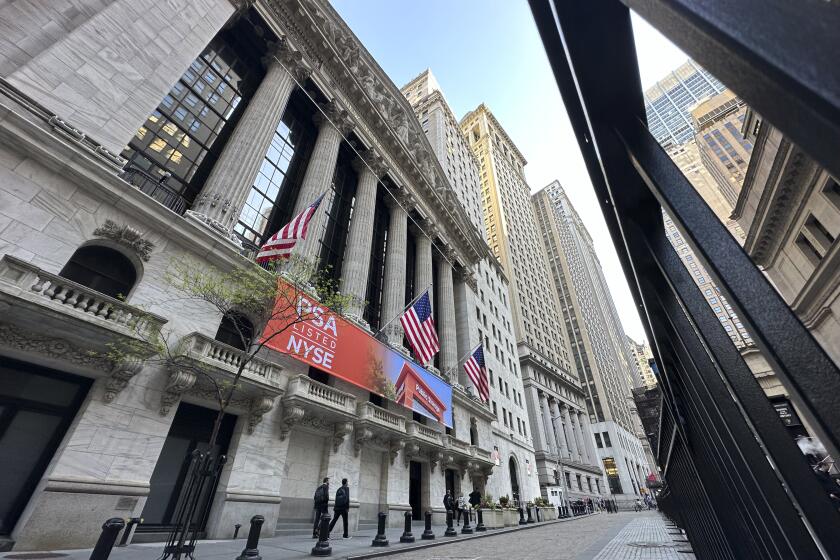The Passive-Active Debate
Did the stock market’s recent fireworks tilt the argument over whether actively managed mutual funds--run by professional stock pickers--are better investments than “passive” index funds that merely ape the general market--or vice versa?
Apparently not.
Fund managers and analysts said the brief, if extremely volatile, swings by the market--and the market’s ability to come surging back after a massive loss--weren’t enough to persuade a significant number of investors to surrender one of those forms of fund investing in favor of the other.
“It will have no effect” on convincing people to choose actively managed stock funds or index funds, said Elliott Shurgin, the general manager overseeing Standard & Poor’s Corp.’s indexes.
“It was such a violent reaction [in the market] that essentially everything got hammered,” he said. “Whether it was actively managed or passive, if you owned stocks everything went down unless you were really lucky.”
Hence, index funds should continue their steady growth of the last three years, but investors far and away will still prefer to buy funds that have stock pickers--even though most of the “active” managers often fail to match the benchmark measure of the market, S&P;’s index of 500 stocks.
Indeed, despite rising sharply since 1994, index-fund investments still represent less than 10% of the U.S. stock market’s $9-trillion value, said George Sauter, a principal at Vanguard Group, a leading purveyor of index-tied mutual funds.
“Clearly, there was no sea change” in investing style, Sauter said, although he added that Vanguard’s index funds ended the harried week with a combined net increase in cash from investors.
The longtime debate between active and passive funds has gotten considerably more attention this year, not only because index funds have grown in popularity, but also because the nation’s largest index fund--Vanguard’s Index Trust 500 Portfolio, which mimics the S&P; 500--has bested the average performance of all other categories of funds, according to the research firm Lipper Analytical Services.
Institutional investors and fund managers, in fact, were debating the merits of indexing at a conference in Palm Springs last week when the market went into its wild swings. But even as prices gyrated, investors there seemed more concerned about the long-term performance of indexers versus stock pickers--and the costs of investing with each--rather than the market’s roller-coaster ride early in the week.
Among individual investors, however, anecdotal reports showed that some who had been buying index funds were so spooked by the market’s gyrations that they’ve shifted cash to actively managed funds--if only because they hope the stock pickers can better shield them from any more sudden drops in the market.
“People wanted a little hand-holding,” said Michael Scafati, a fund analyst at the brokerage firm A.G. Edwards & Sons in St. Louis.
Figures also show that, as the market rebounded from its collapse last Monday, the pros running nearly every major U.S. stock fund failed to perform as well as Vanguard’s Index 500, which has nearly $47 billion in assets and ranks second in size among all stock funds behind Fidelity’s flagship Magellan Fund.
Overall, though, early evidence of cash flows into and out of various funds showed that fund investors generally stayed put during the market’s wild gyrations last week and weren’t inclined to switch their style of investing, analysts said.
“What happened last week isn’t going to shake people’s confidence in mutual funds in general, and index or actively managed funds in particular,” said Russel Kinnel, equity fund editor at the research firm Morningstar Inc. in Chicago.
Overall last week, the most popular stock funds in the country were less volatile than the S&P; 500 index.
Most of the 25 largest stock funds didn’t lose as much ground last Monday as did Vanguard’s Index 500, which dropped 6.9%, according to Lipper. The others lost between 2.8% and 8.5%.
Then when the market roared back the next day, only one--American Century’s 20th Century Ultra Fund--managed to beat Vanguard Index 500’s 5.2% gain. Some of the most familiar names in stock funds didn’t come close, such as Fidelity Investments’ Puritan Fund and Capital Research’s Investment Co. of America Fund.
Explanations for that gap were varied. Some said many actively managed funds had stocks of smaller companies (the so-called small caps, for small-capitalization issues), which had outpaced the big-capitalization stocks in the
S&P; 500 since May. So those active funds didn’t suffer losses as steep as the S&P; 500 index funds last Monday, nor did they bounce back as high as the index funds the next day.
Others noted that active funds routinely keep at least 5% of their assets in cash or in low-yielding securities quickly convertible into cash, whereas index funds such as those tied to the S&P; 500 are naturally fully invested in the stocks that comprise the indexes.
“That makes the active funds less likely to match the 500 going down, and less likely to match the 500 going back up,” said Avi Nachmany, a fund analyst at the consulting firm Strategic Insight in New York.
Index-fund fans will note too that index funds rarely have up-front sales charges (known as loads), as do such actively managed funds as Fidelity’s Magellan, and that actively run funds naturally tend to charge higher management fees. Both costs tend to further pare the performance of active funds relative to that of the passive funds.
But even indexing’s proponents concede that no matter how well index funds perform, the majority of investors still hope they can find a mutual fund manager, such as Fidelity’s legendary Peter Lynch, whose skill will lead them to outperforming stocks.
“Let’s face it,” said Frank Salerno, a managing director for indexing at Bankers Trust Co., “indexing is not very exciting.”
*
Times staff writer James F. Peltz can be reached at james.peltz@latimes.com
(BEGIN TEXT OF INFOBOX / INFOGRAPHIC)
Trailing the S&P; 500
All categories of mutual funds covered by Lipper Analytical have trailed the Standard & Poor’s 500 index this year. (Figures through Thursday).
*--*
Category (No. of funds) Year to date 12 months S&P; 500 index +23.81% +30.53% Growth (936) +20.36 +25.83 Growth & income (692) +20.31 +26.98 Small cap (542) +20.02 +25.05 Genl stock fund avge. (3,011) +19.98 +25.42 Equity income (200) +19.74 +25.93 Health/biotech. (41) +19.41 +26.55 Capital appreciation (246) +18.29 +21.51 Balanced (383) +14.91 +18.87 Science/technology (65) +13.22 +20.15 Utilities (108) +11.48 +16.79 Global (203) +10.19 +15.35 Natural resources (53) +10.06 +14.72 Fixed income (1,811) +7.30 +8.46 International (475) +4.70 +9.60 Emerging markets (148) -1.35 +2.06 Gold (48) -29.76 -32.33
*--*
Source: Lipper Analytical







